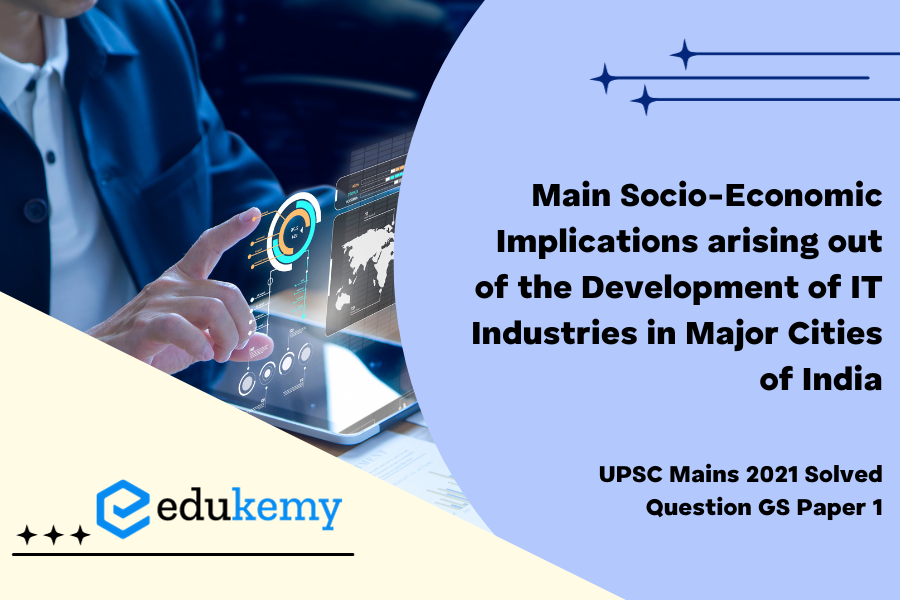The proliferation of IT industries in Indian urban centers has led to significant socio-economic shifts. Economic growth, job creation, and increased urbanization are evident benefits. However, challenges such as income inequality, rapid urbanization strains on infrastructure, and a digital divide pose socio-economic concerns that demand thoughtful policy responses.
UPSC Mains General Studies Paper – 1 Mains 2021
UPSC Mains Civil Services IAS Exam Question Paper – 2021
Contents
Approach
- Start with Brief an Introduction of the keywords “IT industries” with some facts or examples. naming major cities where this industry has grown rapidly.
- Explain the socio-economic implications(positive as well as negative impacts) arising out of the development of this industry.
- Suggest a way forward to correct the issues posed by those implications.
Answer
Introduction
- Information technology (IT) stands as a prime illustration of a versatile technology that harbours the capacity to exert a pivotal influence on economic expansion, alongside various facets of economic and social advancement. In the year 2020, the IT sector contributed approximately 8% to India’s Gross Domestic Product (GDP). Bengaluru, Hyderabad, Pune, Chennai, Noida and Gurugram These cities, among others, form the backbone of India’s IT industry and have contributed to the country’s economic growth and technological advancement.
Body
The main socio-economic implications arising out of the development of IT industries: The development of IT industries brings about both positive and negative socio-economic implications. Here are some of the main ones:
1. Positive Implications
- Economic Growth: IT industries contribute to economic growth by creating business opportunities, attracting investments, and increasing productivity. They stimulate innovation, entrepreneurship, and export potential, leading to job creation and increased revenue.
- Job Creation: IT industries offer a wide range of employment opportunities, both directly and indirectly. They provide well-paying jobs and contribute to reducing unemployment rates. The demand for IT professionals drives skill development, enhancing human capital.
- Technological Advancement: IT industries drive technological innovation, developing new products and services that improve efficiency, communication, and productivity. Technological advancements enhance various sectors, including quality of life, healthcare, education, and public services.
- Global Connectivity: IT industries facilitate global connectivity and communication. They enable cross-border collaborations, remote work, and international trade. Digital platforms expand market opportunities and foster economic integration.
- Empowerment and Inclusion: IT industries empower individuals and promote inclusion. Digital technologies provide access to information, education, financial services, and healthcare, bridging geographic and social barriers. They enable marginalised populations to participate in the digital economy.

2. Negative Implications
- Job Displacement: Automation and technology advancements can lead to unemployment as machines replace human labour in routine tasks.
- Growing Inequality: Unequal access to technology widens the digital divide, creating disparities in education, employment, and economic opportunities.
- Privacy and Security Risks: Increased reliance on digital systems raises concerns about data privacy, cybersecurity breaches, and unauthorised access to personal information.
- Environmental Impact: IT industries contribute to energy consumption, electronic waste generation, and carbon emissions, posing environmental challenges.
- Digital Dependence: Overreliance on digital technologies creates vulnerabilities, making businesses and individuals susceptible to disruptions and cyber-attacks.
- Social Disruption: Rapid IT industry growth disrupts traditional business models and labor markets, requiring individuals and communities to adapt and retrain.
Way forward
- India’s technology services industry has the potential to attain annual revenue of USD 300-350 billion by 2025 through the effective utilisation of emerging technologies like cloud computing, artificial intelligence (AI), cybersecurity, and other advancements. To achieve this, it is essential to invest in these technologies.
- it is crucial to ensure that the investment is evenly distributed and not concentrated in a few locations. For instance, establishing IT-BPO industries in North East cities and Tier 1 and 2 cities would promote balanced growth and inclusivity.
- It is imperative that the development opportunities are accessible and beneficial to all, fostering equal growth and progress throughout the country.
Conclusion
- Hence, The development of IT industries in major cities of India has a profound impact on economic growth, job creation, urban development, skill development, and cultural exchange. While these developments offer numerous opportunities, it is essential to ensure that the benefits are inclusive, and efforts are made to bridge the digital divide and reduce socio-economic disparities.
In case you still have your doubts, contact us on 9811333901.
For UPSC Prelims Resources, Click here
For Daily Updates and Study Material:
Join our Telegram Channel – Edukemy for IAS
- 1. Learn through Videos – here
- 2. Be Exam Ready by Practicing Daily MCQs – here
- 3. Daily Newsletter – Get all your Current Affairs Covered – here
- 4. Mains Answer Writing Practice – here


